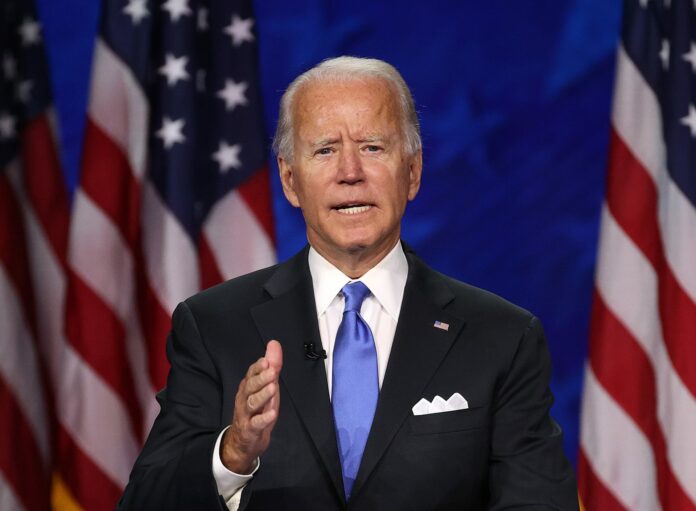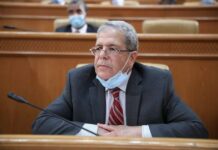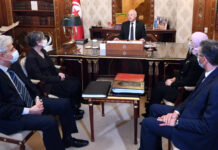U.S. foreign policy is based on a set of constants and variables formulated in an integrated strategy that goes from international to regional and finally domestic, as it considers vital U.S. interests, and the features of the Biden-era U.S. strategy cannot be read with the Tunisian political viraj mentality, but by following what the United States is doing within its strategic space (and we are part of it).
Unlike Trump and since Biden’s arrival, America’s strategy is based on a number of pillars:
First, focus on confronting the Chinese genie: trapping it in East Asia and stopping its expansion in the world, especially in Africa.
Second, value leadership in the world: democracy, individual freedoms, equality, freedom, the right to self-determination etc. etc. (of course except for the Zionist entity, which has a special arrangement)
Third, restoring economic leadership in the world pending the completion of the reconstruction of military power
As a natural result,
Regional Crisis Mail (Resolving the Crisis in Libya, Returning to the Nuclear Deal with Iran, Stopping the Yemen War, Ending the Escalation in Gaza) to Focus on existential Conflict with China
Withdrawal from areas of tension (withdrawal from Afghanistan, close to Iraq and then Syria) for its high intensity and also with the aim of focusing on deployment and concentration in East Asia is the strategic center of gravity for the next decade
*Displacing “dead” elements from the scene that cannot adapt to the path (Haftar, Sarraj, Netanyahu et al…….) that could lead to major crises that hinder U.S. strategy
returning to the classic regional and national balances that have organized America’s relationship for decades, understanding, understanding and role-sharing with its allies from the great powers and the major regional powers,
*Return to understanding with the forces and balances that have ruled states for decades: the deep state or the nation state wherever it exists, after reviving it and adapting to American standards: individual freedoms, democracy, and the liberalization of the economy
Everything that happens in the American vital field and is consistent with the outlines of this strategy is welcome, and everything that is radically contrary to it is doomed to objection and failure.
We now come to political Islam, in the American assessment political Islam failed in its tasks entrusted to it and pledged between 2011 and 2020:
Failed to liberalize the economy, codify competition, dismantle monopoly, rent, mafia and corruption (it became part of it and possibly controlled)
*Failed to run the only state that governed it and achieve social welfare
*Failed to achieve the stability required for international investment and business since it clashed wherever it came to the deep state and its deep-rooted social incubator reached the civil war in Libya, for example, and to the healing of civil war in Tunisia
* Failed to integrate into the ruling elites as a partner in power and in society as the bearer of a project that serves the people instead of serving itself
*Failed to repel terrorism and “angry” Jihadist Islam, but practically became allied with it
*Finally, he failed the exam to pass the Sunni Islamic peace |Hodi and did not seriously engage in the path of normalization and integration of the Zionist entity in Arab societies, and the ultimate strategic goal of the Arab Spring process
Thus, given the foregoing, political Islam has declined from a reliable and essential ally of U.S. interests during the Obama era|Clinton to the rank of reserve ally to be protected on the one hand and also neutralized and reduced at the same time during the Biden era….. And that’s exactly what Ennahda finally understood, and it issued its last statement after it went beyond the stage of intemation, lobbying and denial.
Has the U.S. position changed between before, during and after July 25? He never changed.
Has Ennahda’s position changed? It is certain and consistent that it has changed in the direction of identifying with the American position and responding to the new rules of the game nationally and internationally and the evidence of its transformed data
Finally, president Qais Said’s position remains, did he want to seize the national popular moment to go as far as the international, geopolitical and even national lines of contact? For example, in terms of going to a new political establishment with rules that may change national and international classic balances?
No one knows, but it is hard to present the visit of the U.S. delegation as an American visa to end the current situation and pressure to return to what it was before July 25…. It’s like illusion and nonsense.
To show that it is an illusion and nonsense enough to read the American statement objectively and follow up the statements of Ennahda and the statements of its leaders and match them (in advance) with what is stated in the American text.
Rifi-JDD











